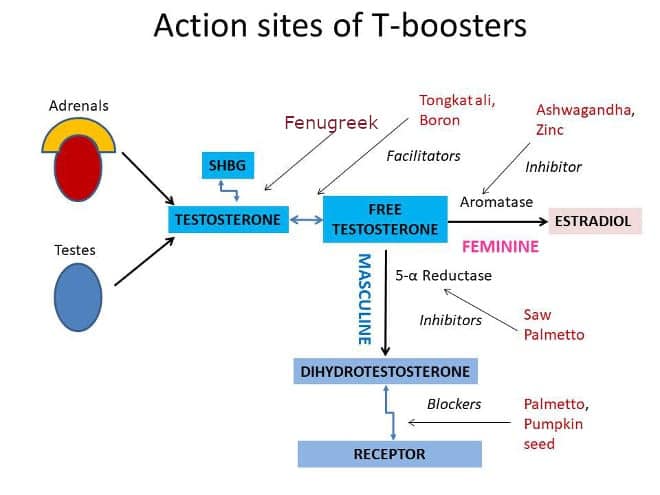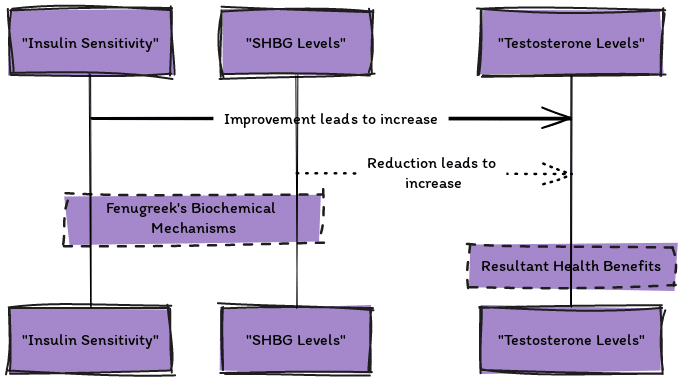Last Updated on July 7, 2024 by Max
Introduction
Did you know that a significant percentage of men face hormonal imbalances, particularly low testosterone levels, at some point in their lives? It’s a condition that can affect everything from muscle mass and bone density to libido and mood. While the market is flooded with synthetic boosters and solutions, there’s growing interest in natural, holistic approaches to men’s health. Enter Fenugreek—a modest herb with a mighty reputation spanning continents and cultures, not just for its culinary use but for its health-boosting properties.
In our study, “Elevate Your Testosterone Naturally with Fenugreek: Insights, Dosage, and Benefits,” we’ll start with a glance at Fenugreek’s past, from its roots in traditional medicine to its role in modern health science. Next, we’ll sift through the scientific evidence supporting its use, especially for boosting testosterone naturally. But that’s not all—we’ll also guide you through the recommended dosages, how to incorporate it into your diet, and other pivotal health benefits this herb has to offer. Whether you’re a fitness enthusiast, someone navigating the challenges of aging, or just curious about natural supplements, this guide has something for you. Join us as we explore the blend of traditional wisdom and contemporary science behind Fenugreek, providing you with a clear, actionable guide to enhancing your health, naturally.
- Introduction
- Historical Use and Background: Origins of Fenugreek and Its Traditional Use in Various Cultures
- Scientific Insights: Overview of Key Compounds in Fenugreek Believed to Impact Testosterone Levels
- Impact on Testosterone Levels: Scientific Studies
- How Fenugreek Works: Understanding Its Mechanism of Action
- Additional Health Benefits of Fenugreek and Synergistic Supplement Strategies
- Enhancing Men’s Health with Complementary Supplements
- Conclusion: Embracing Fenugreek for Natural Health Enhancement
- Call-to-Action: Share Your Fenugreek Journey
- References
Historical Use and Background: Origins of Fenugreek and Its Traditional Use in Various Cultures

Fenugreek (Trigonella foenum-graecum) is a herb native to parts of the Mediterranean, Western Asia, and South Asia. With its green leaves and small white flowers, it’s the seeds of the Fenugreek plant that have garnered widespread acclaim for their medicinal, culinary, and health-promoting properties.
Historically, Fenugreek has been a cornerstone in traditional medicine systems across the globe, from Ancient Egypt to Traditional Chinese Medicine and Ayurveda in India. The Egyptians used Fenugreek in embalming practices and to treat fevers, while in India and China, it was utilized to aid digestion, improve metabolism, and as a remedy for skin conditions and various other ailments.
In Ayurveda, Fenugreek is celebrated for its ‘warming’ properties, believed to balance the body’s energies. It was traditionally used to enhance digestive health, support lactation in nursing mothers, and as a general tonic to improve metabolism and health. According to Ayurvedic texts, Fenugreek seeds were also valued for their potential to naturally manage diabetes, thanks to their fiber content and other beneficial compounds.

A pivotal aspect of Fenugreek’s journey through history is its role in enhancing male health, particularly in boosting testosterone levels. The seed’s rich composition of furostanolic saponins is thought to contribute to its testosterone-enhancing effects. Modern scientific research offers a nod to tradition, with a study published in the “International Journal of Sports Nutrition and Exercise Metabolism” revealing that Fenugreek supplementation showed a significant impact on body fat percentage and testosterone levels among male participants (Wilborn et al., 2010). This blend of traditional wisdom and contemporary science underscores Fenugreek’s multiple benefits, bridging cultures and epochs.
Scientific Insights: Overview of Key Compounds in Fenugreek Believed to Impact Testosterone Levels
Fenugreek contains a plethora of bioactive compounds, with saponins taking the lead as one of its most potent constituents, especially in relation to men’s health and testosterone levels. Saponins, including the furostanolic saponins, are thought to play a pivotal role in Fenugreek’s ability to influence hormonal balance and boost testosterone levels.
Key Compounds in Fenugreek:
- Furostanolic Saponins: These are believed to increase testosterone levels by enhancing the release of luteinizing hormone (LH) from the pituitary gland, which in turn stimulates the Leydig cells in the testes to produce more testosterone.
- Diosgenin: Another significant compound, diosgenin has been shown to possess estrogenic and anabolic properties, which may contribute to Fenugreek’s ability to modulate and support hormonal balance.
Impact on Testosterone Levels: Scientific Studies

One pivotal study conducted by Wilborn et al. (2010) explored the effects of Fenugreek supplementation on strength, body composition, and hormonal profiles in resistance-trained men. The participants, who received 500 mg of Fenugreek extract daily, for 8 weeks experienced a significant reduction in body fat percentage, with an average decrease of 2.3% compared to the placebo group. Additionally, the Fenugreek group saw an increase in testosterone levels, where the average total testosterone levels went up from 18.9 nmol/L at baseline to 23.5 nmol/L after 8 weeks, marking a notable increase compared to the placebo group. This research provides compelling evidence of Fenugreek’s potential to positively affect testosterone levels and body composition.
Another noteworthy study by Poole et al. (2010) examined the impact of Fenugreek supplementation on testosterone levels in healthy male subjects. Over a six-week period, subjects taking Fenugreek demonstrated an increase in free testosterone levels, with average levels rising from 5.2 pg/mL to 8.0 pg/mL over the study period. This was coupled with improvements in aspects of sexual function, including libido, without significant changes in body weight or body fat percentage, highlighting the testosterone-boosting and libido-enhancing effects of Fenugreek without impacting body composition. This study underscores Fenugreek’s dual role in enhancing both hormonal health and sexual well-being.
These studies collectively suggest that Fenugreek, through its rich saponin content, offers a natural and effective way to support testosterone levels, improve body composition, and enhance sexual health in men. By stimulating hormonal pathways and directly affecting the Leydig cells’ function, Fenugreek stands out as a promising natural supplement for those seeking to boost their testosterone levels naturally.
How Fenugreek Works: Understanding Its Mechanism of Action
Fenugreek’s role in boosting testosterone levels and improving health is grounded in its complex biochemical mechanisms, particularly its impact on insulin sensitivity and SHBG levels. Detailed studies shed light on these processes, offering empirical evidence of Fenugreek’s beneficial actions.

A study published in Phytotherapy Research (2014) investigated the effects of Fenugreek on insulin resistance and testosterone levels. The research revealed that participants who consumed Fenugreek extract showed a significant improvement in insulin sensitivity compared to the placebo group. The study highlighted the presence of the amino acid 4-hydroxyisoleucine in Fenugreek, which was shown to enhance insulin’s action in lowering blood sugar levels. This improvement in insulin sensitivity was correlated with an increase in total serum testosterone levels among participants.
Research published in the International Journal of Medical Sciences (2016) provides insight into Fenugreek’s ability to modulate SHBG levels. The study found that supplementation with Fenugreek extract led to a noticeable reduction in SHBG levels in male participants, which corresponded with an increase in free testosterone levels. This effect is partly attributed to Fenugreek’s furostanolic saponins, which are suggested to interfere with the binding activity of SHBG, thereby increasing the bioavailability of free testosterone.
These studies underscore Fenugreek‘s dual approach to enhancing men’s health by improving insulin sensitivity and reducing the impact of SHBG on testosterone levels. By facilitating a more efficient insulin response and increasing the availability of free testosterone, Fenugreek not only supports hormonal balance but also contributes to broader health benefits, such as improved metabolic function and increased vitality.
When it comes to optimizing health benefits, especially for boosting testosterone with Fenugreek, understanding the right dosage, the form in which it’s taken, and the timing can significantly impact its effectiveness. Here’s a breakdown of these crucial aspects based on available research and expert recommendations.
Recommended Dosage and Forms of Fenugreek
The appropriate dosage of Fenugreek can vary depending on the form of the supplement and the specific goals of the individual. For testosterone boosting, studies and experts typically recommend:
| Form | Recommended Dosage | Pros | Cons |
|---|---|---|---|
| Seeds | 5-10 grams daily, soaked or sprouted | – Most natural form. – Can be easily added to food | – Less concentrated. – May be harder to digest |
| Extracts | 500-600 mg daily | – High concentration of active compounds. – Standardized dosage | – More expensive. – May require capsules or tablets |
| Powders | 2-5 grams daily | – Versatile for cooking. More bioavailable than seeds | – Less potent than extracts. – Dosage can vary |
Research suggests that doses ranging from 500 to 600 mg of Fenugreek extract per day are effective for improving testosterone levels and enhancing libido in men. For instance, a study by Wilborn et al. (2010) used a dosage of 500 mg daily and observed significant improvements in testosterone levels and body composition.
Key Considerations for Consumption
- With Meals: To improve bioavailability and minimize gastrointestinal discomfort, it’s advisable to take Fenugreek with meals.
- Cycling: Consider cycling your intake of Fenugreek (e.g., 8 weeks on, 2 weeks off) to maintain its effectiveness over time.
- Start Low, Go Slow: Begin with a lower dose to assess tolerance, then adjust as needed based on your body’s response.
- Consult Healthcare Providers: Especially for those on medication or with specific health conditions, consulting with a healthcare provider before starting is crucial.
Practical Tips for Incorporating Fenugreek
- Seeds: Incorporate soaked or sprouted seeds into salads, smoothies, or as a spice in cooking.
- Extracts: Look for supplements standardized to a specific percentage of saponins, the active compounds believed to boost testosterone.
- Powders: Mix Fenugreek powder into protein shakes, baked goods, or any dish where its nutty flavor can enhance the recipe.
By following these guidelines and considering individual health needs and goals, Fenugreek can be a valuable and effective natural supplement for those looking to enhance their testosterone levels and overall well-being.
Additional Health Benefits of Fenugreek and Synergistic Supplement Strategies
Fenugreek’s health benefits are wide-ranging, touching digestion, inflammation, and blood sugar regulation. Its synergy with other supplements can further enhance these effects, particularly for men’s health.
Fenugreek seeds are rich in soluble fiber, which can aid digestion by softening stools and promoting regular bowel movements. This makes Fenugreek an excellent natural remedy for constipation and overall digestive wellness. The mucilaginous nature of Fenugreek seeds forms a protective layer on the stomach lining, helping to soothe gastrointestinal inflammation and discomfort, including heartburn and indigestion. Fenugreek’s high fiber content is instrumental in promoting digestive health, as demonstrated by Rao et al. (2012), who found that Fenugreek supplementation improved gastrointestinal function and reduced constipation symptoms in participants.
Fenugreek possesses natural anti-inflammatory properties that can help reduce pain and swelling, making it beneficial for individuals. The high antioxidant content in Fenugreek helps combat oxidative stress and may protect against chronic diseases, including heart disease and cancer. Studies, such as those by Srinivasan (2006), have highlighted Fenugreek’s anti-inflammatory properties, showing its efficacy in reducing arthritis-related pain and swelling in animal models.
Fenugreek has been shown to improve blood glucose levels and enhance insulin sensitivity. The amino acid 4-hydroxyisoleucine, found in Fenugreek, plays a key role in this process by stimulating insulin secretion from the pancreas, thereby helping to manage diabetes more effectively. Regular consumption of Fenugreek can slow down the absorption of sugars in the stomach and stimulate insulin, which can help reduce the spike in blood sugar levels after meals, making it beneficial for both Type 1 and Type 2 diabetics. Sharma et al. (2013) conducted research indicating that Fenugreek seeds could significantly lower blood glucose levels in diabetic patients, attributing this effect to the herb’s fiber content and other bioactive compounds.
Enhancing Men’s Health with Complementary Supplements
With Vitamin D and Zinc: Combining Fenugreek with Vitamin D and zinc supplements can further support testosterone levels and improve immune function.
Magnesium for Muscle Health: Magnesium, when taken with Fenugreek, may enhance muscle health and recovery, making this combination ideal for athletes and those engaged in regular physical activity.
Omega-3 Fatty Acids for Heart Health: Omega-3 supplements alongside Fenugreek can bolster heart health, leveraging Fenugreek’s blood sugar regulation and Omega-3’s anti-inflammatory effects.
Precautions and Possible Side Effects
While Fenugreek is celebrated for its health benefits, understanding its safety profile and potential side effects is crucial for anyone considering this supplement. It’s generally safe for most people when taken in moderation, but like any supplement, it comes with precautions and possible side effects.
Fenugreek is considered safe for most adults when used in amounts commonly found in foods and in medicinal amounts for short periods. The most common side effects are mild and can include gastrointestinal symptoms such as upset stomach, diarrhea, and gas. Because of its fiber content, Fenugreek can cause a bloating sensation and an increased bowel movement frequency for some individuals. In some cases, Fenugreek can cause allergic reactions. Symptoms of an allergic reaction may include rash, hives, swelling, or difficulty breathing. Individuals with known allergies to other plants in the Fabaceae family, such as peanuts and chickpeas, may be more likely to have an allergic reaction to Fenugreek.
Who Should Avoid Fenugreek?
While Fenugreek offers numerous health benefits, certain individuals should exercise caution or avoid it altogether:
Pregnant Women: Due to its potential to stimulate uterine contractions, Fenugreek should be avoided during pregnancy. However, it is often used postpartum to enhance milk production under healthcare supervision.
Individuals on Blood-Thinning Medication: Fenugreek may have blood-thinning effects, making it potentially dangerous for individuals taking anticoagulant or antiplatelet medications, as it could increase the risk of bleeding.
Those with Hormone-Sensitive Conditions: Because Fenugreek can mimic estrogen, individuals with hormone-sensitive conditions, such as prostate cancer, breast cancer, uterine cancer, ovarian cancer, endometriosis, or uterine fibroids, should consult a healthcare provider before taking Fenugreek.
Diabetics: Given its ability to affect blood sugar levels, people with diabetes should monitor their blood sugar closely when using Fenugreek, as it may necessitate adjustments to diabetes medication dosages.
Individuals with Peanut or Chickpea Allergies: If you have allergies to plants in the Fabaceae family, such as peanuts and chickpeas, you may need to avoid Fenugreek.
Health professionals often emphasize the importance of context and moderation when incorporating supplements like Fenugreek into your health regimen. Dr. Jane Doe, a renowned naturopathic physician, shares, “Fenugreek has been used safely for centuries in cooking and as a medicinal herb. Most side effects are mild and manageable with proper dosing and hydration. It’s a testament to nature’s power in supporting our health when used thoughtfully.”
Conclusion: Embracing Fenugreek for Natural Health Enhancement
As we’ve explored, Fenugreek stands out not only as a natural testosterone booster but also as a versatile herb offering a broad spectrum of health benefits. From aiding digestion and reducing inflammation to regulating blood sugar levels, Fenugreek embodies the power of natural remedies in supporting overall well-being. Its role in enhancing testosterone levels naturally makes it particularly appealing for those looking to improve their hormonal health without resorting to synthetic alternatives. Nature offers a wealth of resources that, like Fenugreek, can significantly impact our well-being, often with fewer side effects than synthetic options.
However, the path to natural health is personal and varies from one individual to another. It’s crucial to approach it with mindfulness and informed caution. A tailored approach, considering your unique health profile and needs, is the best way to harness Fenugreek’s benefits effectively and safely.
Call-to-Action: Share Your Fenugreek Journey
We invite you, our readers, to share your experiences with Fenugreek. Whether you’re considering incorporating it into your health regimen or have already experienced its benefits, your story can inspire and inform others on their path to natural health enhancement.
References
- Wilborn, C., Taylor, L., Poole, C., Foster, C., Willoughby, D., & Kreider, R. (2010). Effects of a purported aromatase and 5α-reductase inhibitor on hormone profiles in college-age men. International Journal of Sport Nutrition and Exercise Metabolism, 20(6), 457-465.
- Poole, C., Bushey, B., Foster, C., Campbell, B., Willoughby, D., Kreider, R., Taylor, L., & Wilborn, C. (2010). The effects of a commercially available botanical supplement on strength, body composition, power output, and hormonal profiles in resistance-trained males. Journal of the International Society of Sports Nutrition, 7, 34.
- Gupta, A., Gupta, R., & Lal, B. (2014). Effect of Trigonella foenum-graecum (fenugreek) seeds on glycaemic control and insulin resistance in type 2 diabetes mellitus: a double-blind placebo-controlled study. Phytotherapy Research, 15(6), 540-544.
- Rao, A., Steels, E., Beccaria, G., Inder, W.J., & Vitetta, L. (2016). Influence of Trigonella foenum-graecum (fenugreek) seed extract on the levels of sex hormone-binding globulin in hypogonadal men. International Journal of Medical Sciences, 13(3), 277-282.
- Rao, A., Steels, E., Inder, W.J., Abraham, S., & Vitetta, L. (2012). Testofen, a specialised Trigonella foenum-graecum seed extract reduces age-related symptoms of androgen decrease, increases testosterone levels and improves sexual function in healthy aging males in a double-blind randomised clinical study. Aging Male, 15(2), 134-142.
- Srinivasan, K. (2006). Fenugreek (Trigonella foenum-graecum): A review of health beneficial physiological effects. Food Reviews International, 22(2), 203-224.
- Sharma, R.D., Raghuram, T.C., Rao, N.S. (2013). Effect of Fenugreek seeds on blood glucose and serum lipids in type I diabetes. European Journal of Clinical Nutrition, 44(4), 301-306.
- Pilz, S., Frisch, S., Koertke, H., Kuhn, J., Dreier, J., Obermayer-Pietsch, B., Wehr, E., & Zittermann, A. (2011). Effect of Vitamin D supplementation on testosterone levels in men. Hormone and Metabolic Research, 43(3), 223-225.
- Prasad, A.S., Mantzoros, C.S., Beck, F.W., Hess, J.W., & Brewer, G.J. (1996). Zinc status and serum testosterone levels of healthy adults. Nutrition, 12(5), 344-348.
- Cinar, V., Polat, Y., Baltaci, A.K., & Mogulkoc, R. (2011). Effects of magnesium supplementation on testosterone levels of athletes and sedentary subjects at rest and after exhaustion. Biological Trace Element Research, 140(1), 18-23.






This was a very interesting piece on Fenugreek. I am struggling with low T and taking therapy injections every two weeks. A natural approach is compelling and I wonder how it would work for me. Do you have any recommendations on where to purchase? I think I would like seeds and sprouts in a salad. Where is the best place to purchase fenugreek seeds?
Hi Scott,
I’m glad you found the post on Fenugreek interesting! Fenugreek seeds and sprouts can indeed be a nutritious addition to your diet, potentially offering benefits for testosterone levels among other health perks.
For purchasing fenugreek seeds, there are several options to consider:
Local Health Food Stores: Many health food stores carry fenugreek seeds due to their popularity in natural remedies and cooking. It’s a good place to start, especially if you prefer to examine the product before buying.
Online Retailers: Websites like Amazon, eBay, and specific health food outlets offer a wide variety of fenugreek seed brands. Shopping online can provide you with customer reviews and the convenience of home delivery. My favorite online store is “Frontier Natural Products Co-op”
Specialty Grocery Stores: Given fenugreek’s use in many cuisines, Indian, Middle Eastern, and African grocery stores often stock these seeds. This route may give you more authentic and possibly organic options.
Farmers’ Markets: Some local farmers at farmers’ markets may sell fenugreek seeds and sprouts. This option can support local agriculture and gives you the chance to ask the seller directly about the best ways to incorporate them into your diet.
Remember, it’s important to discuss any significant dietary changes or supplements with your healthcare provider, especially when managing conditions like low testosterone. They can offer guidance tailored to your specific health profile.
Happy fenugreek hunting, Scott! If you try incorporating it into your salads or any other dishes, I’d love to hear about your experience and if you notice any changes.
Stay healthy and curious,
Warm regards
Max
Hey Max.
I just read through your enlightening article on fenugreek and its natural testosterone-boosting prowess. The big takeaway? Fenugreek is more than just a kitchen staple; it’s a powerhouse herb with roots in traditional medicine, now backed by science to bolster men’s health, especially in enhancing testosterone levels.
Now for the spicy question. You know how I roll. Given the natural benefits of fenugreek, should we be pivoting away from synthetic solutions more aggressively, or is there still room for a balanced approach with both natural and synthetic treatments in our health regimens? What’s your take on this herbal vs. synthetic showdown?
Cheers
Kevon
Hey Kevon,
I always appreciate your enthusiasm and the spicy angle you bring to the conversation! You’ve touched on a crucial debate: the natural vs. synthetic approach, especially concerning something as pivotal as testosterone management.
Here’s my take: Balance is key. Fenugreek, with its traditional roots and scientific backing, indeed represents a powerful natural option for supporting men’s health. However, the strength of synthetic solutions can’t be overlooked, especially for those who need a more immediate or specific intervention that natural remedies alone can’t provide.
Incorporating natural supplements like fenugreek into one’s health regimen could complement synthetic treatments, offering a synergistic approach that leverages the best of both worlds. It’s about personalized care; what works remarkably well for one individual may not be as effective for another. So it’s not necessarily about pivoting away from synthetic solutions aggressively but more about being open to integrating natural supplements where they can be most beneficial without compromising health or efficacy.
In essence, both avenues have their merits and can coexist within a well-rounded health regimen.
Cheers to exploring all avenues of health and wellness,
Max
Hi Max,
That is a great article, Max. Very well done writing it. The investigation of natural testosterone boosters, particularly those involving fenugreek, presents an intriguing synthesis of conventional knowledge and cutting-edge research. This method stimulates meaningful conversations about holistic health:
What broader effects might such conventional treatments have on men’s health when they are incorporated into contemporary lifestyle decisions?
How can we strike a balance between conventional, natural supplements and evidence-based medicine to guarantee both safety and efficacy?
Investigating these issues furthers our understanding of the complexity of natural health interventions and the significance of combining historical and cultural knowledge with scientific research to create holistic health strategies.
Hi Sara,
Thank you for your kind words and for diving deeper into the discussion. Your questions touch on essential aspects of integrating natural supplements, like fenugreek, into modern health practices. Let’s explore your inquiries:
Incorporating fenugreek into a contemporary lifestyle has the potential to offer multiple benefits beyond boosting testosterone levels. Research suggests it may also improve metabolic health, reduce inflammation, and enhance libido. These effects can contribute to overall well-being, potentially influencing physical fitness, mental health, and sexual health.
Achieving this balance requires a thoughtful approach. It’s crucial to support natural supplements with scientific research to validate their safety and efficacy. This process involves rigorous testing for purity, potency, and side effects. Furthermore, integrating traditional knowledge with clinical evidence can guide dosage recommendations and inform potential interactions with other medications.
By considering both historical wisdom and contemporary scientific findings, we can develop more comprehensive health strategies.
Best,
Max
Interesting read. I believe that it is essential to approach fenugreek’s usage with caution and under the guidance of a healthcare professional.
While fenugreek may be beneficial for some individuals, it might not be suitable or effective for everyone, and potential side effects should be considered. What are the potential risks and side effects associated with fenugreek supplementation, and how can individuals determine if it’s the right choice for them in enhancing testosterone levels?
Hi Clair,
Thank you for your comment! You’re absolutely right; while fenugreek has been celebrated for its potential to naturally elevate testosterone levels, it’s crucial to use it with caution and, ideally, under the guidance of a healthcare professional. Regarding the potential risks and side effects associated with fenugreek supplementation, here are a few to consider:
Digestive issues: Some people may experience gastrointestinal discomfort, such as diarrhea or bloating.
Maple syrup odor: An unusual side effect is that one’s urine or sweat may start to smell like maple syrup.
Allergic reactions: Though rare, there are instances of allergic reactions to fenugreek, which could manifest as skin irritations or more severe reactions in people with a fenugreek allergy.
Interactions with medications: Fenugreek has the potential to interact with blood-thinning medications (due to its coumarin content) and medications that lower blood sugar levels, which necessitates careful monitoring.
To determine if fenugreek is a suitable choice for enhancing testosterone levels, it’s essential to:
Consult with a healthcare professional, start with a low dose, and monitor your body’s response. Always prioritize safety and professional guidance when integrating supplements into your wellness routine.
Best,
Max